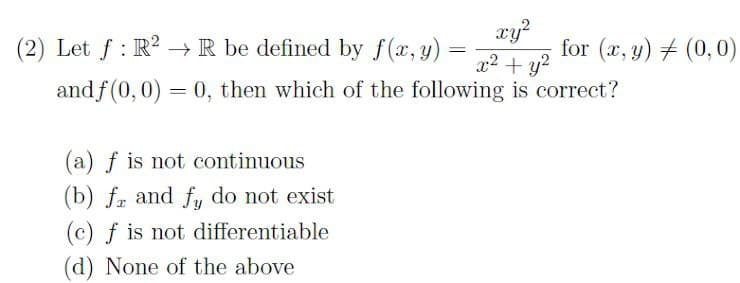xy? x2 + y? and f (0,0) = 0, then which of the following is correct? (2) Let f: R2 –→ R be defined by f(x, y) = for (x, y) # (0,0) %3D (a) f is not continuous (b) fr and fy do not exist (c) f is not differentiable (d) None of the above
xy? x2 + y? and f (0,0) = 0, then which of the following is correct? (2) Let f: R2 –→ R be defined by f(x, y) = for (x, y) # (0,0) %3D (a) f is not continuous (b) fr and fy do not exist (c) f is not differentiable (d) None of the above
Chapter3: Functions
Section3.3: Rates Of Change And Behavior Of Graphs
Problem 2SE: If a functionfis increasing on (a,b) and decreasing on (b,c) , then what can be said about the local...
Related questions
Question

Transcribed Image Text:xy?
for (x, y) # (0,0)
x2 + y?
(2) Let f : R? → R be defined by f(x, y)
and f(0,0) = 0, then which of the following is correct?
(a) f is not continuous
(b) fr and fy do not exist
(c) f is not differentiable
(d) None of the above
Expert Solution
This question has been solved!
Explore an expertly crafted, step-by-step solution for a thorough understanding of key concepts.
Step by step
Solved in 3 steps with 3 images

Recommended textbooks for you


Functions and Change: A Modeling Approach to Coll…
Algebra
ISBN:
9781337111348
Author:
Bruce Crauder, Benny Evans, Alan Noell
Publisher:
Cengage Learning


Functions and Change: A Modeling Approach to Coll…
Algebra
ISBN:
9781337111348
Author:
Bruce Crauder, Benny Evans, Alan Noell
Publisher:
Cengage Learning